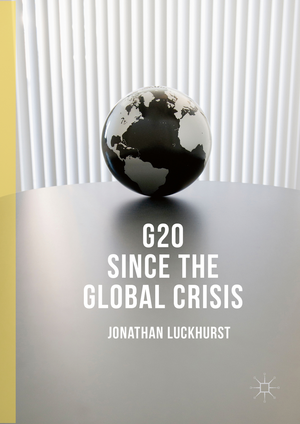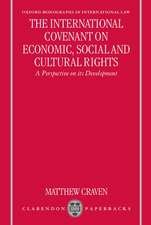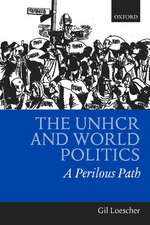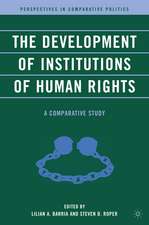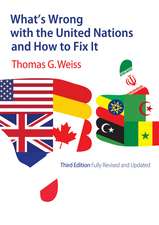G20 Since the Global Crisis
Autor Jonathan Luckhursten Limba Engleză Hardback – 22 apr 2016
This book analyzes the Group of Twenty (G20) since the 2008 financial crisis. The latter event undermined conventional wisdom and governance norms, constituting a more contested international economic regime. G20 leaders sought a cooperative response to the 2008 crisis through the forum, aware of their interdependence and the growing economic importance of key developing states. They agreed to new norms of financial governance based on macroprudential regulation, the Basel III Accords, and enhanced multilateral cooperation. They prioritized G20 cooperation for achieving international economic stability and growth. Differences exist over causes and effects of the crisis, including on the merits of economic austerity or fiscal stimulus strategies; on responsibility for and solutions to international economic imbalances; and concerns about monetary policies and “currency wars”. Despite claims from skeptics that G20 cooperation is declining, this book argues its importance for international relations and as a hub of global governance networks.
Preț: 392.60 lei
Nou
Puncte Express: 589
Preț estimativ în valută:
75.12€ • 81.86$ • 63.30£
75.12€ • 81.86$ • 63.30£
Carte tipărită la comandă
Livrare economică 23 aprilie-07 mai
Preluare comenzi: 021 569.72.76
Specificații
ISBN-13: 9781137551450
ISBN-10: 1137551453
Pagini: 276
Ilustrații: XVII, 300 p. 5 illus.
Dimensiuni: 148 x 210 x 23 mm
Greutate: 0.52 kg
Ediția:1st ed. 2016
Editura: Palgrave Macmillan US
Colecția Palgrave Macmillan
Locul publicării:New York, United States
ISBN-10: 1137551453
Pagini: 276
Ilustrații: XVII, 300 p. 5 illus.
Dimensiuni: 148 x 210 x 23 mm
Greutate: 0.52 kg
Ediția:1st ed. 2016
Editura: Palgrave Macmillan US
Colecția Palgrave Macmillan
Locul publicării:New York, United States
Cuprins
1 – Introduction: G20 since the Global Financial Crisis .- 2 –Strategic Economic Effects of the GFC.- 3 - Ideational and Normative Effects of the GFC .- 4 –International Focus on the G20 .- 5 –G20 Hub for Global Governance .- 6 – G20 Significance for Members and Non-Members.- 7 – China—U.S. Economic Cooperation as Antidote to Strategic Conflict .- 8 –Strategic Competition Probably won’t Prevent G20 Cooperation .- 9 – Conclusion: G20 Importance for International Politics .- Annex A
Notă biografică
Jonathan Luckhurst is Associate Professor of International Relations at the Center for North American Studies of the Pacific Studies Department, University of Guadalajara, Mexico. He is a British academic with a PhD from University of Essex, UK. His research interests include the Group of Twenty (G20) and the 2008 global financial crisis.
Textul de pe ultima copertă
This book analyzes the Group of Twenty (G20) since the 2008 financial crisis. The latter event undermined conventional wisdom and governance norms, constituting a more contested international economic regime. G20 leaders sought a cooperative response to the 2008 crisis through the forum, aware of their interdependence and the growing economic importance of key developing states. They agreed new norms of financial governance based on macroprudential regulation, the Basel III Accords, and enhanced multilateral cooperation. They prioritized G20 cooperation for achieving international economic stability and growth. Differences exist over causes and effects of the crisis, including on the merits of economic austerity or fiscal stimulus strategies; on responsibility for and solutions to international economic imbalances; and concerns about monetary policies and “currency wars”. Despite claims from skeptics that G20 cooperation is declining, this book argues its importance for international relations and as a hub of global governance networks.
